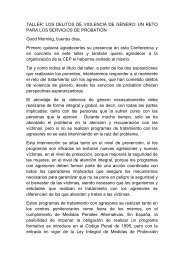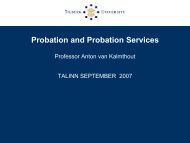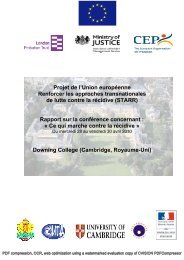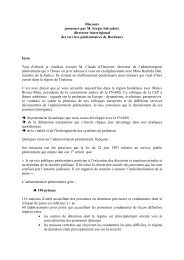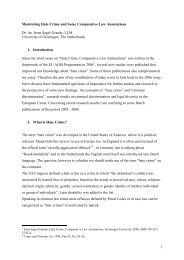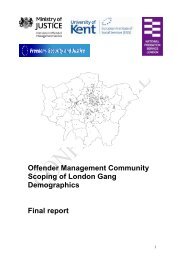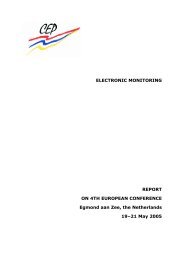Chapter 2 Austria - CEP, the European Organisation for Probation
Chapter 2 Austria - CEP, the European Organisation for Probation
Chapter 2 Austria - CEP, the European Organisation for Probation
Create successful ePaper yourself
Turn your PDF publications into a flip-book with our unique Google optimized e-Paper software.
period. Section 50 of <strong>the</strong> Criminal Code provides <strong>for</strong> probation orders in <strong>the</strong>following cases:- if a sentence is suspended conditionally in full (zur Gänze bedingtnachgesehen), which is possible in case of fines (Geldstrafe) or custodialsentences (Freiheitsstrafe) not exceeding two years (Section 43 CriminalCode);- if part of a sentence is suspended conditionally; which is possible in case offines or custodial sentences not exceeding three years (Section 43a CriminalCode);- if a convicted person is conditionally released (bedingt entlassen) from acustodial sentence; which under various conditions is possible after servinghalf or two thirds of <strong>the</strong> sentence (Section 46 Criminal Code);- if a detainee (Angehaltener) is conditionally released from a preventivemeasure accompanied by detention that is possible in cases of cessation of <strong>the</strong>assumed danger that was <strong>the</strong> basis <strong>for</strong> <strong>the</strong> detention (Section 47 CriminalCode).The basis <strong>for</strong> a probation order is usually <strong>the</strong> fact that <strong>the</strong> court does not deem<strong>the</strong> implementation of a sentence (or at least not of <strong>the</strong> whole sentence)necessary, but deems supervision by a probation worker necessary, in order toprevent <strong>the</strong> convicted offender from committing fur<strong>the</strong>r offences. A precondition<strong>for</strong> each type of conditional suspension or release from a custodial sentence isfur<strong>the</strong>rmore that <strong>the</strong> (continued) execution of <strong>the</strong> sentence is not required inorder to prevent o<strong>the</strong>rs from committing offences. In cases of juvenile offences(offences committed by persons between 14 and 18 years of age), Section 22 of<strong>the</strong> Juvenile Court Act also provides <strong>for</strong> <strong>the</strong> possibility of probation orders <strong>for</strong> <strong>the</strong>following cases:- temporary suspension of proceedings (vorläufige Einstellung einesStrafverfahrens auf Probe);- provisional suspension of penalty (Vorbehalt des Ausspruches der Strafe), and- deferral of <strong>the</strong> execution of a custodial sentence (Aufschub des Vollzugs einerFreiheitsstrafe).In accordance with §35 of <strong>the</strong> Act on Addictive Substances, <strong>the</strong> public prosecutorcan temporarily suspend criminal proceedings related to an offence involvingaddictive substances or accessory crimes, if <strong>the</strong> suspect (among o<strong>the</strong>r measures)agrees to supervision by a probation worker. The same conditions apply to <strong>the</strong>temporary suspension of criminal proceedings by a court. With <strong>the</strong> consent of <strong>the</strong>suspect, provisional probation (vorläufige Bewährungshilfe) can be orderedbe<strong>for</strong>e sentencing according to § 197 of <strong>the</strong> Code of Criminal Procedure. Thisorder may serve as a more lenient measure <strong>for</strong> avoiding pre-trial detention(Untersuchungshaft). Voluntary probation (freiwillige Bewährungshilfe) inaccordance with §27a of <strong>the</strong> <strong>Probation</strong> Service Act is possible after anunconditional release (unbedingte Entlassung) from custody or a preventivemeasure involving detention (Freiheitsentziehung).4.1.1.1 Mediation in penal matters (Außergerichtlicher Tatausgleich,ATA)


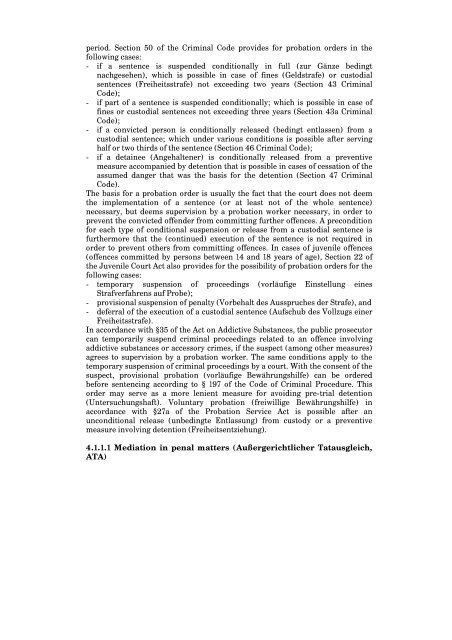
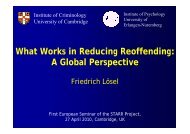
![AGIS2 Nov 08 Conference Report_[Version 2] - CEP, the European ...](https://img.yumpu.com/50764570/1/190x245/agis2-nov-08-conference-report-version-2-cep-the-european-.jpg?quality=85)

